Known by many to be the greatest ballroom dancer of this generation, Victor Fung is a giant in the world of competitive ballroom dancing, just as Michael Jordan is to basketball and Tiger Woods is to golf. He and his current dance partner, Anastasia Murayeva, have won multiple national and world titles throughout their ten-year partnership. In June of 2017, the two won the open professional ballroom title at the Blackpool Dance Festival, the most prestigious ballroom dance competition in the world.
Who is the man behind the legend? How did Victor come to achieve such success, not just in dancing, but in other areas of life? This is his story.
Growing Up
Victor was born and raised in Orange County, CA, to parents Anthony Fung and Jeannie Fung. Victor has three other siblings— Jennifer, Alex, and Tiffany— all of whom danced competitively as well.
As a young kid, Victor participated in a wide array of activities. Besides going to school, Victor was a competitive swimmer, training six days a week with dual practice sessions before and after school. He played both violin and piano, and was enrolled in Kumon, an after-school math and reading program geared at helping kids accelerate in their academics.
At the age of 8, Victor was introduced to ballroom dancing by his parents, who enjoyed dancing socially. His mother enrolled him and his siblings into a kids’ class at a local studio, the Imperial Dance Academy. “I liked it right away. There were a few other kids there, and I had a great time. Within three weeks, I did my first competition, which was the USA Dance Nationals. I danced with my sister, and my brother danced with another girl. It was just us two couples, and we were competing against each other. After that first competition, I thought, ‘That’s it, I’m done with dancing.’ Then my mom said, ‘No no no, we’re going back to class.’ The next month I did another competition, then the following month I did another, and I’ve never looked back since.”
One of his greatest dance inspirations growing up was a dancer named Augusto Schiavo. “I loved the way he conducted himself and his personality on the dance floor. He was very masculine and commanding on the floor, so dominant, so powerful and so domineering. That sort of composure and energy he brought to the floor was incredible. I was always watching him on videos. He was my role model as a dancer. I never met him until I was an adult, and only had one lesson with him in my entire career.”
Victor cites a couple reasons why he decided to ultimately pursue the International Standard style of ballroom dance, as opposed to its sister style, International Latin. “I started with Standard first because my early teachers were more inclined towards Standard. The first two dances I learned were Waltz and Quickstep. I later started to learn Cha Cha and Rumba, then Tango and Foxtrot. It was the influence of my teachers that led me to stay with the Standard side. I am also more inclined towards Standard. I like watching Latin, but when I watch myself do Latin I say, ‘No, that’s not for me.’ I felt more connected with ballroom. I liked the idea of dressing up and wearing a tail suit and bowtie. From day one I knew I was more of a Standard dancer.”
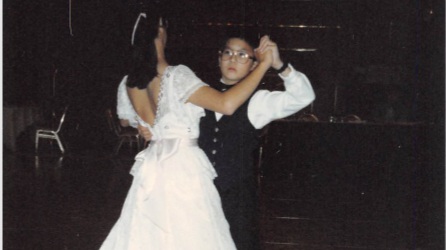
Living a Double Life at University
At the age of 18, Victor started college at the University of California, Los Angeles. When asked whether he ever considered forgoing college for the sake of dancing, Victor replied, “No, I never had the idea of skipping out on college. I didn’t want to give up my degree.”
Victor graduated from UCLA with a B.S. in Biochemistry and a minor in Business Administration. Originally, he intended to go down the medical school path, but decided to switch to dentistry, a track that would afford him a little bit more time for dancing while in school. “To become a dentist, you have to take the Dental Admissions Test (DAT). At one point, I was thinking about not taking the exam at all. Fortunately, my mother encouraged me to do it. She said, ‘Victor, you’ve come this far, and if you take the exam, you will have a choice between dental school and dancing.’ So I took the DATs, and I’m really glad that I did. I scored very very high on the exam, which showed me that if I put my mind to something, I can accomplish anything.”
In spite of his academic successes, Victor could hardly call his college experience an easy or traditional one. While his mind was rooted in school, his heart yearned for dancing. When asked whether he felt frustrated that school took away time from his dance training, Victor replied, “I felt that way every single day during my time at UCLA. Especially at that age when you’re young and you’re hooked on life and you want to go and experience exciting things, and then you’re stuck in the classroom. What makes it worse was that I was in biochemistry. I remember sitting in the Young Hall stadium seats, basically feeling like one peanut in a whole bucket of nuts. I felt so insignificant, and every single day I just wanted to leave college. Every quarter I would leave school for a week, either for the World Championships, UK Open, or Blackpool. I wasn’t able to do what all my other competitors were doing. The percentage of time I dedicated to dancing was far less than that of other dancers in Europe because of my commitment to my studies. That was the thing that frustrated me the most when I was in college. I knew that my competitors were practicing daily, non-stop. I knew it. I felt like I was at such a disadvantage. I was practicing twice a week for two hours, and having only one lesson, whereas they would be in England having many lessons, and practicing every day. They were there for weeks having lessons before Blackpool, whereas I would just show up and dance the competition. I knew I was at a disadvantage from my competitors, in that sense. At the end of the day it really didn’t matter, though, because it’s really what you do with the information you receive and what you do with your time that matters.”
Victor shares how he managed his double life of school and dance. “Monday through Friday, I’d wake up at 8am, go to class, have lunch, then go to the library, sit down and study, until the evening. On Friday night, I would be picked up by my parents and I would go to the Westmor Dance Studio and practice for two hours. On the weekends, I’d go home and study. On Sundays, I would study, then have a dance lesson, then go to Westmor at night and practice for two more hours, after which my parents would drive me back to UCLA. If I wasn’t practicing at Westmor, I would be at UCLA watching dance videos and practicing by myself at [the school gym]. Some of the students that didn’t understand what ballroom was all about would come in, and probably wondered, ‘What is this crazy guy doing?’”
Regarding his studies, Victor says, “I never went to the professor’s office hours. When I would be absent from class, I would merely open the book and figure the subject material out myself.”
That Victor was able to balance both school and dance and perform so well in both disciplines reflects his strength of character, which he describes as “steadfast and persistent, through and through.” He recalls one particular individual who inspired him to achieve what many deem impossible. “There was a doctor who used to be a professional ballroom dancer. He got his medical degree while he was competing at the top of the amateur field. I asked him how he did it, and he said, ‘You’d be amazed at what people can do when they put their minds to it. Most people underestimate what they can do. They put their goals pretty low and underachieve.’ I never forgot his words. I told myself, ‘If this guy can do it, why couldn’t I do it?’”
To dancers who are faced with the crossroads of pursuing dance or an academic education, Victor says, “I definitely think that it’s very important to have an academic degree. I actually think dance and education go hand in hand, because the thing about dancing or any type of art form or sport is that it requires discipline. When you are good at your studies, you are good at other things. When you are good at your sport or your art, you can also be good at other things. Dancing taught me a lot as far as discipline, hard work, and dedication. Those skills transferred over to my studies, and vice versa. If anybody is thinking about skipping out on degree to pursue a passion, definitely pursue your passion, but also get a degree. It’s just good for you, and it’ll provide you with a safety net if dancing doesn’t work out.”
Becoming the Blackpool Champion
Before college, Victor had never competed at the prestigious Blackpool Dance Festival. The annual competition dates back to the 1920s, and is held in the Empress Ballroom at the Winter Gardens in Blackpool, England.
1996 was the first year Victor competed at Blackpool with his sister, in the Youth division. “I went there and made the final, and finished fourth! How I did it, I don’t know. I guess they noticed my dancing. All the work I had done, paid off. The other competitors who made the final had been there a couple years already. When I made the final that year, I thought, ‘Maybe I’m on to something.’”
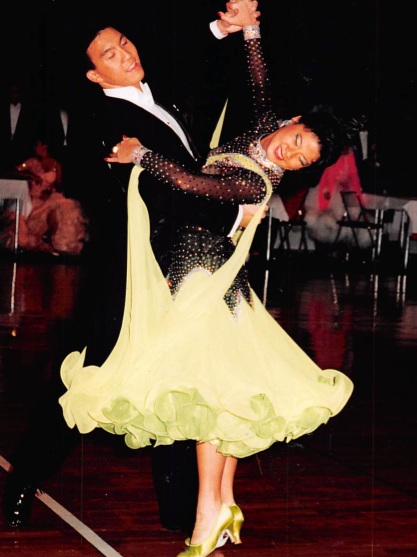

Little did young Victor know that, several years later, in 2017, he would win the professional Blackpool title with Anastasia. He recounts the mixture of emotions he felt the day of their victory. “When we won, there were elements of both happiness and relief. In a way, the pleasure of it came later, after we won. In the moment it was very stressful and honestly not a lot of fun. It was a moment where I felt like I had to prove myself to others. When we didn’t win the Waltz, I thought, ‘Oh dear.’ Then we won the Foxtrot and Tango, which was kind of cool. And then for the Quickstep, the couple standing in front of us looked like they knew they had won that dance. If they had won that dance, we would be in a Rule 11 situation. Even thinking about it right now I’m starting to get nervous. That was the most stressful situation in my entire dancing career and life.”
Interestingly, Victor says, “I think in that moment, winning the Blackpool title, even though it was important, it came a little too late in my life. I think if I had won it a few years earlier in my life, it would have been more significant to me. For everybody, things have to come in their lives at the right time. So when we finally won Blackpool, we were of course very happy since we finally did it after so many years. It was a nice thing to check off the bucket list. However, if we had won it a few years earlier, when public opinion mattered more to us, it might have been a little bit sweeter. But it was still a great feeling.”
When asked whether it was his goal from a young age to become the next ballroom champion, Victor says, “Not really. I think it was always my goal to become the world amateur champion, but I never imagined myself becoming a professional champion. I was pursuing my dancing and had a number of partners. I eventually realized that reaching the world amateur champion title wasn’t really in my cards, so I decided to turn professional. I found the right partner for me at the time, and kept going. My goal was always to improve my dancing and improve my skills. It wasn’t always about having a title, for titles are ways to quantify progress, but they are not really the most accurate measures, because in our business they’re all based on other people’s opinions. When your definition of success is based on other people’s opinions, that’s not really the best way to live your life. It is better for you to be your own best critic and your own best judge. If you measure your success based on external factors, then your life, your mood, your temperament will change on a whim because your results might be good this time and bad the next. It’s just not a healthy way to live our lives.”
When asked whether there is a secret formula to creating a ballroom dance champion, Victor took a step back and examined closely the definition of a champion. “When I was younger, in my mind, champion was the individual that was number one. And the individual that had the most number ones next to his/her name was the greatest champion. This is how I think society defines a champion. As I got older, I realized that being a champion is not about how many times you’ve won. It’s your character that makes you a champion. It’s your character and your ethics, who you are as a person, how you lift yourself up in difficult times, and how humble you are in good times, that makes you a champion. A champion understands what it takes to succeed, sets goals and achieves those goals, understands the value of hard work and is willing to do the hard work. A champion understands what it means to lose and fail. It’s not about the failure, it’s about learning from the failure and growing in the process. A champion is respectful of their competitors, respectful of people that have shaped their past, and respectful of the up and coming generation. The term ‘champion’ is a multi-faceted, all-encompassing term. The person who wins first place can have really bad character and not have champion qualities. Sometimes I think there is more of a champion in the individual that has never won. He or she has a much greater understanding of what it means to be human and what it means to fail, to succeed and what it means to work hard.”
Victor continues, “We all understand numbers. People view number one as being better than number two, number two better than number three. I don’t think so. If we think that way then we’re really narrowing our minds. We all can be a champion in ourselves. I believe that a single mom who takes care of three kids while working a full-time job is a great champion. There’s a lot of hard work and a lot of dedication to the family. That for me is a champion. Having results is one way we can quantify in our industry. But if you’re talking about the actual champion, for me it’s about one’s character.”
Asked what inspires him to keep dancing, after having won Blackpool, Victor replies, “Blackpool has 11 judges. Those 11 judges, on that day and moment believed that, ‘Victor and Anastasia, are deserving of the Blackpool title.’ Well, the next day I may not be number one. Just because you win one competition doesn’t mean it is the end. If it is, that’s kind of sad, because then you’re just working for a number. Dancing really is an art. No artist would say, ‘I want to do 100 paintings and then I will finish.’ As an artist, [your art] becomes who you are. To stop dancing just because you’ve won a competition means you’re not a ‘true’ dancer. True dancers that are true artists understand that there is no ending to development and the creation of art. One may stop competing and stop doing shows but that doesn’t mean you stop growing. It’s a never-ending pursuit. As a true artist, you never stop growing. We all need to grow; it doesn’t matter how old you are, we all need to continue growing, developing, and learning.”
Dance Politics
In an industry inextricably linked to politics, where making the right connections is in many ways more important than skill level in predicting a dancer’s placement in competition, it can be difficult for dancers to maintain character and integrity, dance on their own terms, and play by their own rules, without their competitive results suffering. In turn, many dancers lose focus and direct their attention away from the dancing itself, and more towards pleasing the right people. When asked for his thoughts on people-pleasing and politics in the world of competitive ballroom dance, Victor says, “Politics in dancing is a natural part of the business. The important thing for me is to make decisions that make me happy and decisions I feel I can live with. For me, I feel that at the moment I’m in a very healthy place in my life where other people’s opinions do not reign supreme in my mind, but instead my own happiness and Anastasia’s happiness are most important. And, that means we dance in the way that makes us happy and not make decisions based on what other people think and want. It’s a very healthy and empowering feeling. Because at the end of the day, we all have just one life and one dancing life…it is short, and so it should be enjoyed to its upmost.”
He continues, “Our innate nature is to associate ourselves in groups. When you’re in a group, there’s a certain feeling of safety, justification, and security. But I think that’s a false sense. The security has to be within yourself. If you can stand on your own two feet, make your own decisions, and be happy with yourself then that I think is true self-confidence and strength. I would really wish everybody to have their own sense of security and the confidence in themselves and the ability to do their own thing, make their own decisions, dance where they want to dance, dance how they want to dance, and not worry about what other people think. I think then you will find true happiness.”
Joys and Challenges of Dancing
When asked what he loved most about ballroom dancing, Victor said, “I just really love the feel when I’m dancing with Anastasia. Plain and simple. I love that I can do that every day. I love it when everything just works, when everything’s in harmony. I’m creative, she’s responsive, she’s creating, I’m responding. I love the feeling of dancing with her.”
In terms of challenges, Victor says, “I’m not a big fan of traveling, but that’s just a part of it. Politically, there are challenges, of course. Politics is human relationships, and how you interact with people. If you’re good with that then politics can work for you. But if you choose to focus on the negative, it’ll get to you. If you choose to focus on the positive, then the negatives don’t seem to matter as much. I honestly don’t see that many challenges in being a dancer, especially if the goal is pure. Nobody can stop you from making yourself better. If you focus on that and make that the goal, you don’t really see the challenges. The big thing is the dancing. I’m lucky because I haven’t had any physical limitations or injuries in my career.” Laughing, he adds, “I don’t drink enough water. That’s one other challenge, I suppose. I sweat a lot and get dehydrated.”
Competition Rituals
Victor recalls wise words from a former teacher that have served him well throughout his dance career: “The competition should be your reward for all the hard work you’ve done leading up to the competition. It should not be the punishment. It shouldn’t be like, ‘I’m going to be tested.’ Competition should be party-time!”
Victor notes that it is completely normal for dancers to feel nervous before competition, for if you aren’t nervous, it probably means you don’t care enough. However, he adds, “If I’ve done the preparation and hard work before the competition, then I don’t feel nervous. For me, the nerves come from when I start worrying about what other people think. My focus then shifts to the external management of people’s reactions, which nobody should care about. Just focus on doing the best that you can, and that should be it.”
Victor also brings up an important distinction between two schools of thought on judging—and how this distinction can drastically alter the way a competitor performs on the dance floor. “I think judges look at judging in one of two ways: they either look for a mistake, or they look to be inspired. [The former] mode of judging is a very easy and ‘safe’ way to judge. I don’t think its a very healthy way to judge, especially when you tell this to a competitor. The dancer is then ingrained with the fear of making a mistake. Judges who look to be inspired are the ones that will reward a dancer for doing something great during the competition. Judges are also audience members. They should be looking to be inspired. Whoever inspires the most should be rewarded.”
He adds, “If I allow the negative approach of judging to get to my head, that doesn’t help me. I like to focus on the positive. I like to find people in the audience and say, ‘I am going to inspire you today. I’m going to spend all of my positive energy to inspire you, the audience.’ I want you to walk away feeling like, ‘Oh my god, I love ballroom dancing, and my faith in ballroom dancing is completely renewed because I watched Victor and Anastasia perform with such inspiration.’ It all starts from your mindset and your attitude when you go to the competition.”
Ballroom Dance—Sport, or Art?
In an industry inextricably linked to politics, where making the right connections is in many ways more important than skill level in predicting a dancer’s placement in competition, it can be difficult for dancers to maintain character and integrity, dance on There is a long-standing debate in the world of Dancesport regarding the nature of ballroom dance—is it a sport rooted in technical execution, or is it an art characterized by creative expression? When asked for his thoughts on this topic, Victor says, “Dancing is, I believe, an art, with a sportive and athletic element to it. Like with any sport, you have to have good technique. However, I think you should perfect your technique to the 90-95% level. The rest of your technique should be helping to enhance your artistry. The ultimate goal is to create the art. Technique is just something your body and mind need to help create the art, but at end of the day, you still need to create the art. As dancers and artists, we should not become slaves to the technique. During practices, you should have a portion focused on technique, and an equal portion, if not more, focused on artistry. That way, when you go to competition, you have a better chance of feeling great. Is there perfection in dancing? I don’t think so, because dancing is an art. That terminology of ‘perfection’ doesn’t really apply to dance.”
Victor and Anastasia are currently working hard in preparation for this year’s Blackpool, which is coming up at the end of this month. Whether or not they take home another title, remains to be seen. Whatever the result, Victor’s champion character shines brighter than any medallion or trophy in the world. He is hardworking, humble, intelligent, and refuses to live life on anyone’s terms but his own. He epitomizes not only what it means to be a champion dancer and artist, but also what it means to be a champion person.
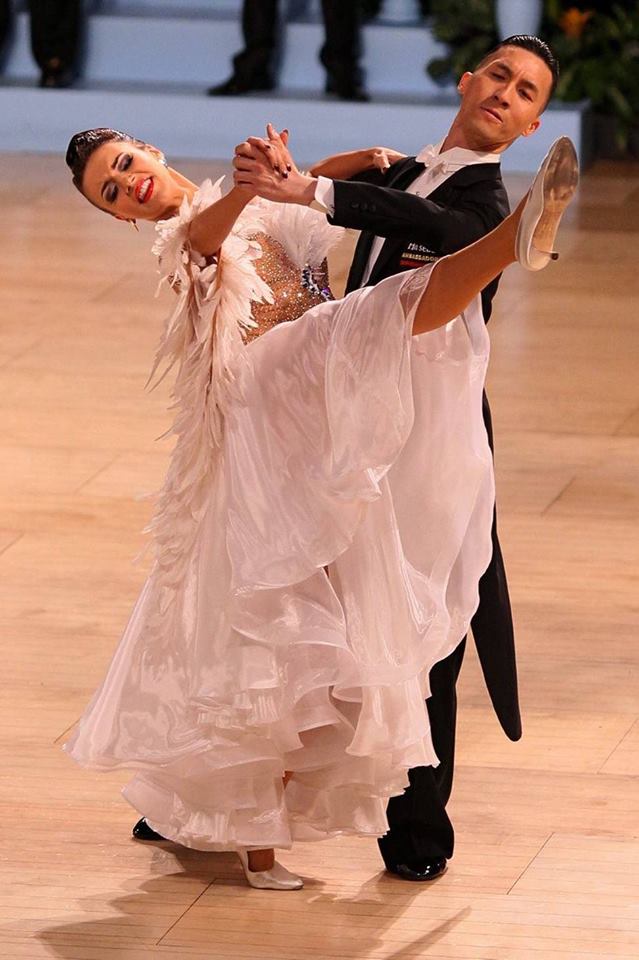

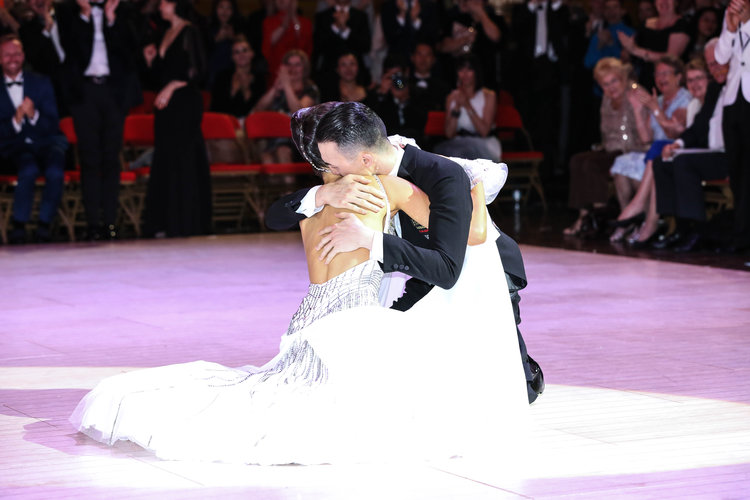
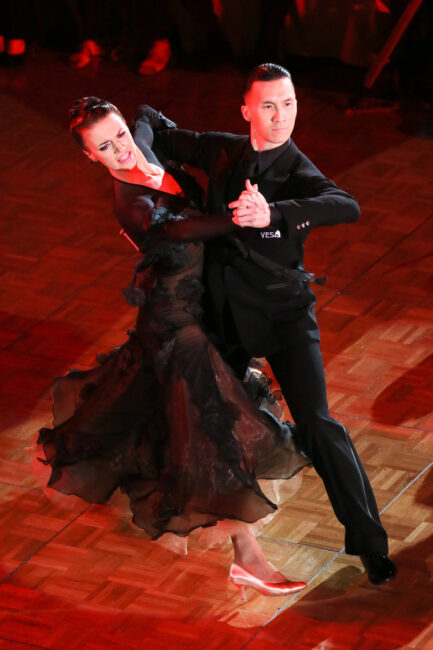
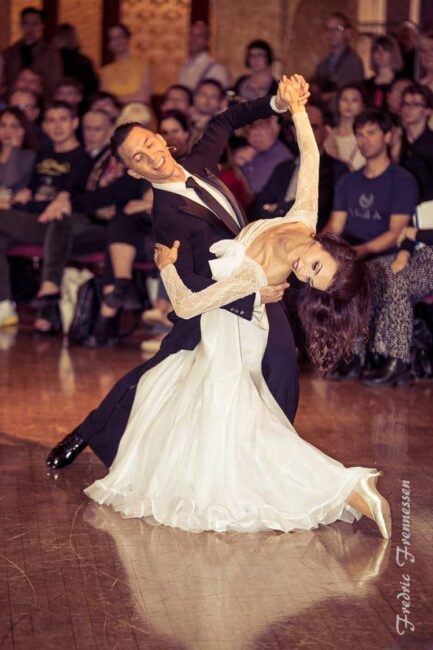
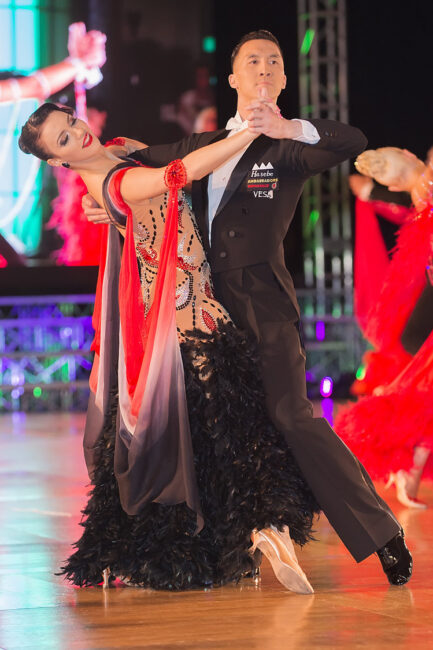
0 Comments